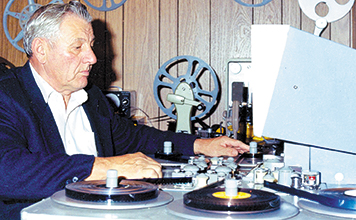
films that document the lives of Mennonites. (Photo courtesy of Ken Reddig)
Otto Klassen dedicated many years of his life to making documentaries that tell Mennonite stories. A self-taught filmmaker, he produced a total of 84 films in his lifetime, most of them full documentaries. This is quite an achievement, since he made his living as a bricklayer and regarded filmmaking as a hobby. He received an honorary doctorate from the University of Winnipeg on Oct. 21, 2007, in recognition of his work.
Born in Ukraine when it was part of the Soviet Union, he experienced many challenges in his younger years, including terror under the Stalin regime, the horror of the Second World War and the hardships of pioneering in Paraguay. While many around him perished during those years, he survived and believed it was his responsibility to tell the story of how Mennonites persevered in spite of suffering and how their faith sustained them.
As a teenager during the war, he gained some experience in working with photographic equipment when he was assigned to assist a German photographer documenting the war. Although he was haunted by some of the images he saw through the lens of a camera, he also developed a passion for photography. He was intrigued by the war documentaries being put together by German film crews and came to recognize the power of story told through motion pictures.
When the war ended, he took the risk of returning to the Soviet-occupied zone of Germany to rejoin his family. In 1947, they were able to immigrate to Paraguay, where he met and married Kaethe Bergen in 1949. They immigrated to Canada with two young children in 1955 and settled in Winnipeg, attending Springfield Heights Mennonite Church.
Klassen developed his own masonry business, but soon was also known for his photography and subsequently his films. He closely analyzed documentaries, including those made by Disney, and visited famous professional studios to develop his skills.
In the 1970s, he produced a six-part series in the German language that told the story of the Mennonites in Paraguay. Another early major work, released in 1985, was The Great Trek, a two-part documentary about the Mennonite experience in Russia during the Second World War. Part of what makes this film so powerful is that Klassen persisted until he was given permission to use footage from the official German archives. Also impressive is the fact that he wrote the scripts and self-funded these projects. Known for careful work and historical accuracy, he worked in several languages, including English, High German, Low German and Spanish.
Other films by Klassen include documentaries about Mennonites in Manitoba and in Mexico. More recent projects were Remembering Russia 1914-1927, Escape Via Moscow 1929, and Women’s Burden Under Stalin, each 45 minutes in length.
The story of his life, I Remember: The Story of Otto Klassen, was translated into English and published in 2013. It is available at the CommonWord Bookstore and Resource Centre at Canadian Mennonite University. Klassen donated his Mennonite films to the Mennonite Heritage Archives and DVD copies of some of them are available there.
Klassen is survived by his five children, Irmgard (George), Otto, George (Betty), Anne-Marie (Frank) and Charlotte (Rick). He was predeceased by his wife Kaethe in 2003.



Add new comment
Canadian Mennonite invites comments and encourages constructive discussion about our content. Actual full names (first and last) are required. Comments are moderated and may be edited. They will not appear online until approved and will be posted during business hours. Some comments may be reproduced in print.